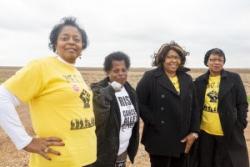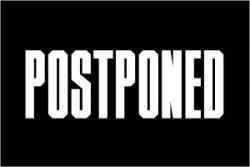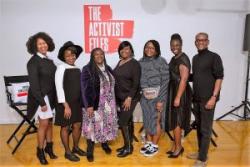New report suggests additional burial grounds of enslaved people likely exist on proposed plastics site
[caption align="right"] On Wednesday, community members of RISE St. James submitted an expert report to the St. James Parish Council that shows as many as seven cemeteries likely containing the remains of enslaved people may exist on property slated for development of a massive facility by Formosa Plastics.[/caption]
On Wednesday, community members of RISE St. James submitted an expert report to the St. James Parish Council that shows as many as seven cemeteries likely containing the remains of enslaved people may exist on property slated for development of a massive facility by Formosa Plastics.[/caption]Archeologists from Coastal Environments, Inc. (CEI), working on their own and behind the scenes, first alerted the Louisiana Division of Archaeology to the existence of two of the cemeteries on the Formosa site, which led to further site investigations by Formosa’s consultants and confirmation of one of the cemeteries on the former Buena Vista Plantation. Using detailed maps from 1877 and 1878 combined with a process known as cartographic regression, CEI was able to identify the likely location of three cemeteries shown on those maps on former plantations, as well as four other possible cemeteries that did not appear on the historic maps. They also concluded that Formosa’s consultants looked in the wrong place each time they searched for a cemetery on the former Acadia Plantation.
“Our ancestors are crying out to us from their graves—they are telling us to not let industry disturb their burial sites. Formosa Plastics did not inform the citizens of St. James or the parish council of the existence of the graves when they knew—they don’t care, they just want to profit from St. James parish,” said Sharon Lavigne of RISE St. James.
Learn more on our website.
A note from the CCR family about COVID-19
[caption align="right"] [/caption]
[/caption]At this time of crisis and deep concern, we want to reach out to our beloved community to affirm our fellowship and the value of our collective vision. What aches so much about this particular crisis, unlike others we have faced together, such as the post-9/11 human rights atrocities, the Iraq War and others, and our increasing authoritarian lurch, is that what we strive for most — human connection and physical presence — actually now threatens us. At the Center for Constitutional Rights, we continue our work to support each other, our partners, and communities in need, and we are taking all precautionary measures, including canceling all non-essential events and travel to minimize the spread of the virus...
Continue reading on our website.
POSTPONED: The Social Justice Throwdown
[caption align="right"] [/caption]
[/caption]As a precautionary measure against COVID-19, we will be postponing the Social Justice Throwdown, which will now take place on September 17, 2020 in New York City.
Public health crises are intimate reminders that we are all connected. We have come to this decision in an effort to limit the spread of this virus as much as possible and to better protect those who are most at risk.
While we are disappointed to not be able to celebrate with you sooner, we are excited for the opportunity to bring you an even bigger and better event this Fall. We will communicate more on our revised plans as soon as possible and hope that you will all be able to join us then!
The Activist Files: How Would it Feel to Be Free - Southern resistance to gender oppression
[caption align="right"] [/caption]
[/caption]“How Would Feel to Be Free: Southern Resistance to Race and Gender Oppression” is our first live recorded podcast, where our Communications Director Chandra Hayslett led a discussion about the fights for racial, gender, and LGBTQIA+ justice in the South with Lakeesha Harris, Reproductive Justice and Sexual Health Program Manager, Women with a Vision; Valencia Robinson, CEO and Founder, Mississippi in Action; and Quita Tinsley, Deputy Director, Access Reproductive Care-Southeast.
The 24th episode of “The Activist Files” was recorded Feb. 28, 2020 at Studio Arte before a live audience and was the culmination of our Black History Month celebration. The guests covered a wide range of topics, including the need to cross state lines to access abortions, how doctors are discriminating against LGBTQIA+ people, and the need to center trans Black women because of violence.
Listen to the full episode on our website.

